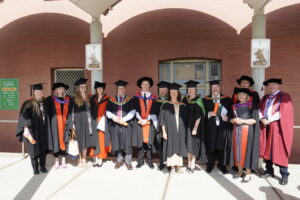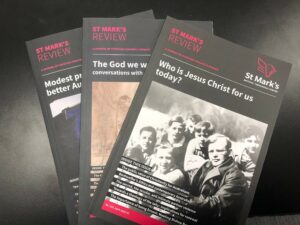Greetings from St Mark’s for 2018! I am looking forward to the year. We have every reason to think that St Mark’s is well-positioned again to help people deepen their faith, expand their awareness under God, and skill-up for a variety of helping tasks.
However, I must begin with a confession. Although I meant to write you a Christmas greeting in 2017, I did not know what to write.
On the world and national-scene, and in many people’s lives, the year seemed so difficult and daunting. Theologians’ comments on such times can seem twee, ultimately reducing theology to a kind of parallel-world abstraction into which we might retreat for a time—say, over Christmas—only to return to ‘reality’ when we have to. Much as I love the advent of Christ, I didn’t want to write anything about him that smacked of ‘unreality’. But I’ve had a turn-around on that. You might know what follows; maybe I forgot it a little.
In The Passionate God (London: DLT, 1981), Rosemary Haughton describes the ‘narrows of the present’—that concrete here-and-now we inhabit, between past memory and imagined future. ‘The present is now, this minute, with all the people in it. It is the menu at the restaurant this evening, the people in the local prison tonight, the lesson the kids are learning in class this afternoon, the debate going on in the chambers of government and business—the open one and the secret one.’ She lists more examples in supermarkets, with computers, in hospitals. We could add things to do with smartphones, health challenges, family struggles, workplace issues. The ‘now’ ‘is our stifling limitation and our essential challenge’ (pp. 3–4).
I was struck by that, because for many I talk to and in my experience, so much revolves around the ‘now’. I suppose these are our version of what Jesus calls ‘cares’, ‘lures’ and ‘desires’ of the moment (Mk. 4:19)—although our ‘now’ always self-evidently seems much harder than anyone else’s, even maybe including the ‘now’ of Jesus’ time.
I was also struck last year by the sheer weight of instability and change. Our national politics was in constant flux. The global order felt like nothing we have ever seen before. Church life is pressured by social change and public scrutiny like never before. No workplace seems able to catch its breath in the middle of all the comparison, competition and compliance that fills our days. Our domestic lives flip-flop between safe-haven and bewildering muddle. Therefore added to the ‘now’ is anxiety about ‘what next’, tinged with sadness about the good things or people or conditions that are no longer with us. Those are conditions under which we find it hard to notice, give thanks and feel joy for any good things in the ‘now’.
Haughton’s view, however, is that it is the passionate love of God that has put us each into flux and change, and which powers that flux and change. We know this to be so, she reasons, because of Jesus’ Incarnation and Resurrection: the Flesh-taking of Jesus, the determination of God somehow to become and to remain Jesus.
People, she reckons, don’t mind a God who is ‘numinous’, ‘pervasive’, ‘glorious, benevolent and (if sometimes explicable), comforting’. We also quite like a Jesus who was ‘heroic, gentle, “whole”, healing, poor and persecuted’. But what we cannot take, actually, is a God ‘so passionate he has to be Jesus, a Jesus so passionate that he has to be God’ (p. 7).
This determination of God to take ‘flesh’ ensures, beyond all doubt, that God’s love extends to our experiences of the now as it unfolds to the next. God remains intimately in-touch with that, and behind it and within it and under it and over it and through it. Jesus made and makes it so for God. (I am in turn reminded that Jesus knew all about the fear that talk of war and revolution brings, Lk 21:9).
For Haughton, it follows that wisdom ‘is a human gift and a name of God.’ Stay with me: ‘In Scripture Wisdom is “she”, and she sets her table in public and summons one and all.’ She ‘is an invitation to experience Heaven and Hell, life and death, to know them in the facts of nuclear power and food co-ops and police methods, or attitudes to babies and the poor and the handicapped and what we put in the soil. … Wisdom is simply the apprehension of God in human experience through its whole extent. That is Christian theology, for Christianity is the revelation of Wisdom in one historical yet eternal point, physical and spiritual and personal and cosmic … that the revelation of God in Christ is what life is all about’ (pp. 4–5).
So as it happens, I am pretty optimistic about 2018 at St Mark’s. The cares of each day remain messy, and talk about the future always beckons us to anxiety. But, we get to study Wisdom. We get to know the Flesh-taking God, who knows us in Christ, through whom we can gradually become assured definitely loves us within—and maybe even by using—‘the changes and chances of this fleeting world’.
Read on, and contact us if you’d like to join in.











